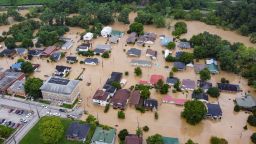The same storm system that brought so much rain and snow to the western US is moving east and intensifying, making for a potential severe weather outbreak that could impact nearly 70 million people from the Mississippi Valley to the Ohio and Tennessee Valleys on Friday.
“A concerning scenario appears to be developing,” warned the Storm Prediction Center. “Intense, damaging gusts and several tornadoes (some strong and long-track) are expected.”
This weather pattern will be similar to the ones we have seen repeatedly over the last few months, when an atmospheric river event or storm system impacting the West intensifies as it moves eastward, resulting in a severe weather outbreak across the midsection of the country.
There is a small chance of storms Thursday across the Plains, including in Oklahoma City, Tulsa, Sioux Falls and Topeka. We could also see gusty winds, hail and the possibility of an isolated tornado.
However, the severe threat ramps up on Friday.
The storm center has placed a Level 4 out of 5 “moderate risk” of severe weather for nearly 4 million people in two separate areas along the Mississippi River: For portions of northeastern Arkansas, the Missouri Bootheel and western Tennessee, including Memphis, and for portions of eastern Iowa and northwest Illinois.
Places such as Cedar Rapids, Davenport and Iowa City are included in the severe weather threat.
“Things are still looking quite volatile in our region for Friday,” the National Weather Service office in Quad Cities, Iowa, said. “The storm motions are progged to be over 50 mph, given the strong wind fields, so people should plan ahead for sheltering in case severe weather strikes, as these storms will be moving quickly!”
A wider area that stretches from northern Iowa and southwestern Wisconsin down to central Mississippi and southern Arkansas is under a Level 3 out of 5 “enhanced risk” of severe weather.
This threat affects more than 14 million people in places such as Nashville, St. Louis, Des Moines and Little Rock.
“Initially there could be a small tornado threat with storms as they enter our western counties, but a line of storms with a straight-line damaging wind threat will ultimately be the main concern,” the National Weather Service office in Nashville explained.
Winds could gust as high as 70 mph and large hail is possible.
Many of these storms will continue into the overnight hours, creating an even more dangerous scenario because people are asleep.
How to be safe in severe weather
This severe weather event comes one week after a deadly tornado outbreak killed dozens of people, many of them in Mississippi.

“For this week our highest chance of severe weather is a little north of where it was last week,” National Weather Service meteorologist Amber Schlessiger told CNN. Schlessiger says that the region hit hard one week ago must be prepared. “People are going to be asleep and not put their alarms on until the next morning, so they need to have a way to be woken up.”
There is also an existing threat of severe weather for more than 31 million people from southern Minnesota and Wisconsin down to portions of East Texas, northern Louisiana, Mississippi and Alabama.
Gusty winds, large hail and the possibility of isolated tornadoes are all possible as the fast-moving storms track eastward.
Along with the severe threat, heavy rainfall could lead to flooding. The prediction center has highlighted an area that stretches from eastern Oklahoma to Kentucky for a slight risk of excessive rainfall.
“Hourly rates of 1-2 (inches) +/hr are possible (with these hourly rates largely driving the flash flood threat, as the bulk of the forecast precipitation is expected over a period of 3-6 hours,” the prediction center explained.
Once the storms form, we could see them begin to “train” – meaning they roll over the same areas for long periods of time. This will be the main driver for potential flash flooding.
Blizzard conditions possible
Heavy snow will spread across much of the Upper Midwest, adding to their already banner winter season.
“Winter weather-related advisories are in effect from South Dakota east into Minnesota and Wisconsin for the potential of snow totals generally between 3-6 (inches), with locally heavier totals of 10 (inches) + possible,” the prediction center said.
Along with heavy snow, winds gusts as high as 50 mph could lead to whiteout conditions.
“Gusty winds behind the front upwards of 50 mph will lead to areas of blowing snow and blizzard conditions, making travel treacherous to impossible.”
Temperatures will remain unseasonably cold with highs on Thursday and Friday only making it into the 20s and 30s.
Lows at night will drop into the single digits Saturday morning.





